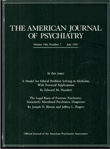Nightmares and trauma: a comparison of nightmares after combat with lifelong nightmares in veterans
Abstract
In this study the chronic traumatic nightmares of men who had been in combat were found to differ from the lifelong nightmares of veterans with no combat experience in that they tended to occur earlier in the sleep cycle, were more likely to be replicas of actual events, and were more commonly accompanied by gross body movements. Traumatic nightmares may arise out of varying stages of sleep and are not confined to REM sleep alone. The group with lifelong nightmares showed evidence of thought disorder on the Rorschach. The men with posttraumatic stress disorder had failed to psychologically integrate their traumatic experiences and used dissociation as a way of dealing with strong affects.
Access content
To read the fulltext, please use one of the options below to sign in or purchase access.- Personal login
- Institutional Login
- Sign in via OpenAthens
- Register for access
-
Please login/register if you wish to pair your device and check access availability.
Not a subscriber?
PsychiatryOnline subscription options offer access to the DSM-5 library, books, journals, CME, and patient resources. This all-in-one virtual library provides psychiatrists and mental health professionals with key resources for diagnosis, treatment, research, and professional development.
Need more help? PsychiatryOnline Customer Service may be reached by emailing [email protected] or by calling 800-368-5777 (in the U.S.) or 703-907-7322 (outside the U.S.).



